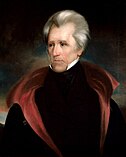User:Ric36/Yesterday's featured article
Andrew Jackson (March 15, 1767 – June 8, 1845) was the seventh president of the United States, serving from 1829 to 1837. He was a frontier lawyer and briefly served in the House of Representatives and the Senate, representing Tennessee. He became a wealthy planter who owned hundreds of African-American slaves during his lifetime. In 1801, he was appointed colonel of the Tennessee militia and was elected its commander. In the War of 1812 against the British, Jackson's victory at the Battle of New Orleans in 1815 made him a national hero. He later commanded U.S. forces in the First Seminole War, which led to the annexation of Florida from Spain. He was elected president in 1828, defeating John Quincy Adams in a landslide. In 1830, he signed the Indian Removal Act. This act displaced tens of thousands of Native Americans from their ancestral homelands east of the Mississippi and resulted in thousands of deaths. Jackson's legacy remains controversial, and opinions on his legacy are frequently polarized. (Full article...)

